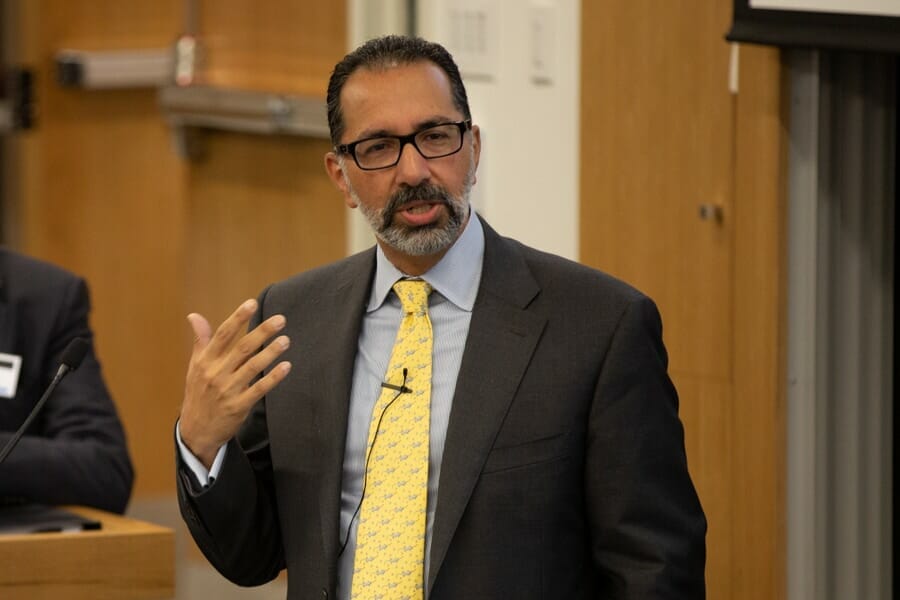Low for ever, a risen China and climate change, are just some of the 10 changes set to sweep through the investment industry in the next 10 years, said Cyrus Taraporevala, president and chief executive of State Street Global Advisors. In his opening speech to 85 asset owners from 20 countries responsible for a combined $9 trillion assets under management at the Fiduciary Investors Symposium at Harvard University, Taraporevala described a brave new world where only the fittest survive.
Deflationary pressure will stretch into the future with low for long becoming low for ever – or at least in the lifetime of conference participants. “Deflation, not inflation is the biggest challenge,” he said. Despite historical economic expansion in the US, wage growth and productivity remains low. Low rates of unemployment in developed markets hide a continued decline in labour force participation, especially in the US. Despite continued monetary stimulus, Central Banks are struggling to meet inflation targets resulting in a poor macro backdrop for asset prices in the years ahead. Around a quarter of global government debt currently trades at negative interest rates.
“What if this grew to 50 per cent by 2029?” he asked. It leaves investors needing to take on more risk and complexity in their portfolios to meet savers’ objectives, resulting in a keen focus on fees where every basis point matters.
Technology will transform every corner of the investment industry, impacting how investors research, trade and build their portfolios, creating industry winners and losers. The quest for data and technology is the new industry arms race, determining who comes out on top, he said. This will result in even more pressure on fees, highlighting how much of a return is genuine, skills-based manager alpha. Data and technology will also drive a move away from fundamental stock picking strategies to data driven systematic strategies, he predicted. However, Taraporevala does not believe machines will replace humans just yet. Instead the industry will focus on recruiting data scientists and software engineers to ensure survival into the future, resulting in fierce competition for talent with the tech sector.
By 2029 the largest asset manager in the world will be Chinese, Taraporevala predicted. Although US asset managers today are much bigger, Chinese asset managers are growing at break-neck speed. Assets under management in China will see an annual growth rate of 17 per cent over the next 5 years.
Factors driving this growth include more funds flowing from China’s shadow banking sector into mutual funds and digital disruption, as fintech firms leapfrog western competitors and move into the heart of asset management. Chinese asset managers could also buy foreign groups as the country moves into the global capital markets, marking the biggest regional shift in history of asset management.
As DC continues to replace DB, so the onus on individuals to save for their retirement will grow. Moreover, as people live for longer, retirement periods could double. This will demand change in the decumulation phase to ensure people “don’t run out of money,” in turn triggering different retirement income solutions. These could include LDI-based strategies in individual nest eggs, dynamic drawdown strategies and income annuities to manage longevity tail risk, as well as governments stepping in with new securities to hedge tail risk, the use of behaviour economies and new technologies to personalise solutions for individual investors.
Come 2029 the balance of assets in index funds and ETFs compared to active allocations will have flipped in favour of passive in a trend that spreads beyond equity to fixed income. It will be driven by the ability to analyse true sources of alpha.
“In 10 years time these skills will be razor sharp,” he said. “Active managers will be disrupted out of existence.” Benchmark huggers, who still account for a large portion of the industry revenue pool, won’t be able to hide anymore. He said this will improve the quality of active management and prioritise the importance of asset allocation, making this the “new alpha.”
Over the next decade ESG will no longer be a standalone. “A company’s ESG rating will be as important as its credit rating.” Taraporevala also predicts investors will increasingly focus on the long-term with the emergence of a “patience premium” whereby investors reward companies that take a long term focus and penalise those that don’t. Compensation will focus on the long term, and asset managers will offer investors enhanced commercial terms for long-term strategies.
He also predicts that retail investors will be able to invest more in private markets, which they currently struggle to access. While DB funds have found rich returns in private assets, DC funds have struggled. The decline in the number of companies going public is locking out DC savers from an important seam of wealth in a “de-democratisation of investment.”
Regulation will adjust so retail investors can access private market opportunities, he predicted. In the future investors will be able to choose from a wider investment choice to create personalised portfolios based on their own preferences.
Taraporevala’s final prediction focuses on climate change “the biggest challenge for our industry and human life. Here he forecasts that only those investors able to “take seriously” the value destruction potential of climate change will survive.
The industry is still viewing climate change in the context of customer preference, not thinking about it through investment values, he said. Ten years from now the value of investors’ holdings will be depleted because of the ravages of climate change. We as investors have a genuine opportunity to deploy capital in a way to support climate solutions and embrace opportunities, he concluded.




